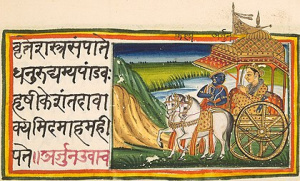Language/Sanskrit/Grammar/Gender
Hi Sanskrit learners! 😊
In this lesson, we will learn about grammatical gender in Sanskrit. Understanding gender is essential to understand the grammar of any language. Just like in many other languages, Sanskrit words are divided into three genders, masculine, feminine, and neuter.
If you want to improve your Sanskrit Grammar, you can also use the Polyglot Club website. Find native speakers and ask them any questions!
Overview[edit | edit source]
Gender in Sanskrit is not determined based on the biological gender of the noun. Instead, words are categorized into gender based on different factors like endings, roots, and usage in a sentence.
Knowing the gender of nouns is important when determining appropriate adjective and verb forms to use. For instance, masculine and neuter words use simple words to indicate emotion, while feminine words use complex words.
Now, let's take a closer look at each gender.
Masculine[edit | edit source]
Masculine nouns in Sanskrit typically end in the consonants like क, ग, च, ज, and so on. These are often the default gender when the gender of the noun cannot be identified by other means. Some masculine nouns are:
| Sanskrit | Pronunciation | English |
|---|---|---|
| धर्मः | dharmah | Religion |
| मानवः | manavah | Human being |
| देशः | deshah | Country |
| पुस्तकः | pustakah | Book |
Here's a sample dialogue:
- Person 1: धर्मः कथमस्ति? (What is religion?)
- Person 2: धर्मः नैतिकता ओकः आस्ति। (Religion is a system of morals.)
Feminine[edit | edit source]
Feminine nouns in Sanskrit often end in आ, or they have the अ sound at the end of a word elongated. Sometimes, they end with इ, ऎ, or ए। Some examples of feminine nouns are:
| Sanskrit | Pronunciation | English |
|---|---|---|
| गीता | geetah | Song |
| पृथ्वी | prithvee | Earth |
| भारती | bharati | India |
| उपायः | upayah | Plan |
Let's see a conversation with a feminine noun:
- Person 1: गीता रंगम् ओनंट् होति न। (The colors of the song are not visible.)
- Person 2: गीता संस्कृतस्य पुस्तकस्य ओधाहरणमस्ति। (The Gita is an example of Sanskrit literature.)
Neuter[edit | edit source]
Neuter nouns in Sanskrit often end in म् or have an अ at the end. With some exceptions, all pronouns in Sanskrit are neuter. Here are some examples of neuters in Sanskrit:
| Sanskrit | Pronunciation | English |
|---|---|---|
| रत्नम् | ratnam | Jewel |
| मणम् | manam | Bell |
| दण्डम् | dandam | Stick |
| यन्त्रम् | yantram | Machine |
Here's an example dialogue with a neuter noun:
- Person 1: मणं जले डूबति। (The bell sinks in water.)
- Person 2: मण एतस्मिन् बुद्धौ स्मृतः। (The bell is a reminder of the Buddha.)
Exceptions[edit | edit source]
There are a few exceptions to the rules of gender in Sanskrit. Some nouns can be both masculine and feminine depending on the context. For instance,
| Sanskrit | Pronunciation | English |
|---|---|---|
| मोक्षः | mokshah | Salvation |
मोक्षः can be either masculine or feminine. Another example is हृदयं (hrdayam), which can be either neuter or masculine.
Conclusion[edit | edit source]
In this lesson, we learned that gender in Sanskrit is not based on the biological gender of nouns. Instead, it is based on different factors like endings, roots, and usage in a sentence. We also saw examples of nouns in each gender and exceptions to the rules.
To improve your Sanskrit Grammar, you can find more information on Sanskrit Grammar on Wikipedia.
➡ If you have any questions, please ask them in the comments section below.
➡ Feel free to edit this wiki page if you think it can be improved. 😎
Sources[edit | edit source]
- Gender, case, and number | Learn Sanskrit Online
- Higher Sanskrit Grammar: Or, Gender and Syntax, With Copious ...
- Noun Basics | Learn Sanskrit Online
Congratulations on finishing this lesson! Explore these related pages to keep learning: Future Tense & Questions.
Videos[edit | edit source]
Sanskrit Grammar | Gender | लिंग परिचय - YouTube[edit | edit source]
Sanskrit Lesson 1.3 Neuter Gender - YouTube[edit | edit source]
He, She, It, Word Genders, Spoken Sanskrit | Day 2A - YouTube[edit | edit source]
Ling in Sanskrit | लिंग | Gender | Sanskrit Grammar - YouTube[edit | edit source]
Other Lessons[edit | edit source]
- Conditional Mood
- Negation
- Plurals
- Pronouns
- How to Use Have
- Future Tense
- How to Use Be
- Give your Opinion
- Questions

